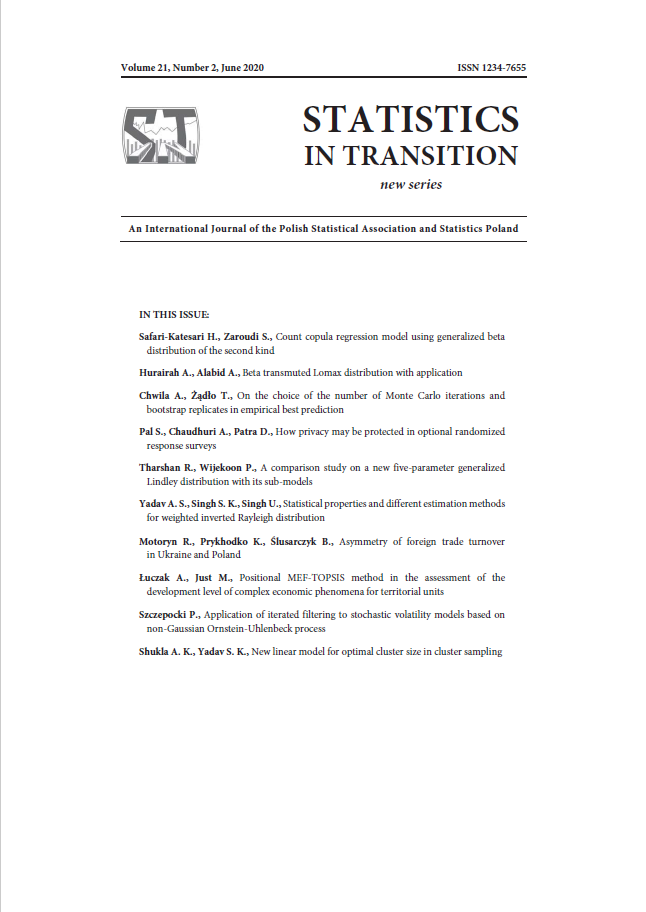ARTICLE
ABSTRACT
There are materials in literature about how privacy on stigmatizing features like alcoholism, history of tax-evasion, or testing positive in AIDS-related testing may be partially protected by a proper application of randomized response techniques (RRT). The paper demonstrates what amendments are necessary for this approach while applying optional RRTs covering qualitative characteristics, permitting a sampled respondent either to directly reveal sensitive data or choose a randomized response respectively with complementary probabilities. Only a few standard RRTs are illustrated in the text.
KEYWORDS
protection of privacy, randomized response, sensitive issues, Warner and other techniques
REFERENCES
ARNAB, R., (2004). Optional randomized response techniques for complex survey designs. Biom, J. 46, pp. 114-124.
ARNAB, R., RUEDA, M., (2016). Optional randomized response: A critical review. Handbook of statistics, Elsevier, 34, pp. 253-271
CHAUDHURI, A., (2001). Using randomized response from a complex survey to estimate a sensitive proportion in a dichotomous finite population, Journal of Statistical Planning and Inference, 94, pp. 37–42.
CHAUDHURI, A., (2011). Randomized response and indirect questioning techniques in surveys. CRC Press, Fl. USA.
CHAUDHURI, A., CHRISTOFIDES, T. C., (2013). Indirect questioning in sample surveys. Springer-Verlag, Berlin, Heidelberg.
CHAUDHURI, A., DIHIDAR, K., (2009). Estimating means of stigmatizing qualitative and quantitative variables from discretionary responses randomized or direct. Sankhya B, 71, pp. 123–136.
CHAUDHURI, A., MUKERJEE, R., (1985). Optionally randomized responses techniques. Calcutta Statistical Association Bulletin, 34, pp. 225–229.
CHAUDHURI, A., SAHA, A., (2005). Optional versus compulsory randomized response techniques in complex surveys, Journal of Statistical Planning and Inference, 135, pp. 516-527.
CHAUDHURI, A., CHRISTOFIDES, T. C., RAO, C. R., (2016). Handbook of statistics, Data Gathering, Analysis and Protection of Privacy Through Randomized Response Techniques: Qualitative and Quantitative Human Traits. Elsevier, NL, 34, pp. 2-525.
CHAUDHURI, A., CHRISTOFIDES, T. C., SAHA, A., (2009). Protection of privacy in efficient application of randomized response techniques, Statistical Methods and Applications, 18, pp. 389–418.
GREENBERG, B. G., ABUL-ELA, A.-L., SIMMONS, W. R., HORVITZ, D. G., (1969). The unrelated question RR model: Theoretical framework, Journal of American Statistical Association, 64, pp. 520–539.
GUPTA, S., (2001). Qualifying the sensitivity level of binary response personal interview survey questions. Journal of Combinatorics, Information and System Sciences, 26 (1- 4), pp. 101-109.
GUPTA, S., GUPTA, B., SINGH, S., (2002). Estimation of sensitivity level of personal interview survey question, Journal of Statistical Planning and Inference, 100, pp. 239-247.
HORVITZ, D. G., THOMPSON, D. J., (1952). A generalization of sampling without replacement from a finite universe, Journal of American Statistical Association, 47, pp. 663-685.
HUANG, K. C., (2008). Estimation of sensitive characteristics using optional randomized techniques, Qual. Quant. 42, pp. 679-686.
KUK, A. Y. C., (1990). Asking sensitive questions indirectly. Biometrika, 77(2), pp. 436-438.
LAHIRI, D. B., (1951). A method of sample selection providing unbiased ratio estimates, Bulletin of International Statistical Institute, 3, pp. 133-140
MIDZUNO, H., (1952). On the sampling system with probability proportional to the sum of the sizes, Annals of the Institute of Statistical Mathematics, 3, pp. 99-107
PAL, S., (2008). Unbiasedly estimating the total of a stigmatizing variable from a complex survey on permitting options for direct or randomized responses, Statistical Papers, 49, pp. 157-164
SAHA, A., (2007). Optional randomized response in stratified unequal probability sampling. A simulation based numerical study with Kuk's method, Test 16, pp. 346-354.
SEN, A. R., (1953). On the estimator of the variance in sampling with varying probabilities, Journal of Indian Society of Agricultural Statistics, 5, pp. 119-127.
WARNER, S. L., (1965). Randomized response: a survey technique for eliminating evasive answer bias, Journal of American Statistical Association, 60, pp. 63-69.
